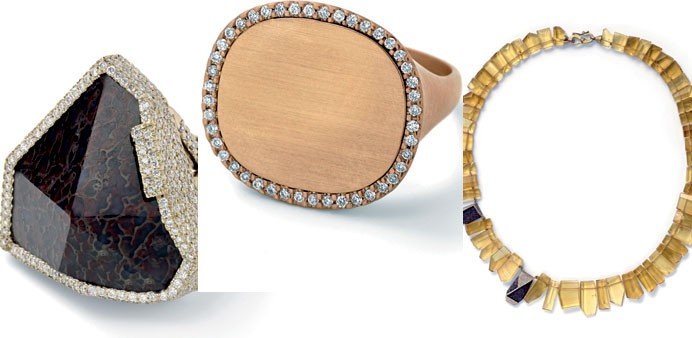* Fossilised dinosaur bone ring with conflict and devastation free white diamonds, 18-carat recycled white gold, 2.28 TCW retails for $24,400. * Signature ring with white diamond pave; 18-carat recycled rose gold. Retail Price: $6,655. * Golden beryl, fossilised dinosaur bone and conflict and devastation free white diamond necklace, 18-carat recycled yellow gold, 0.44 TCW retails for $17,150.
By Booth Moore
Monique Pean is one of the most talented new American jewellery designers working today. She founded her line in 2006, bringing a sustainable approach to her work by using recycled gold and conflict-free stones.
Since then, she’s attracted the attention of the Council of Fashion Designers of America, winning the Vogue Fashion Fund Award in 2009, and of First Lady Michelle Obama, model Karlie Kloss, actresses Jennifer Lawrence and Emma Watson and many more who have worn her unique designs.
Each time the New York-based Pean creates a collection, she travels to a new place, immerses herself in the culture, connects with artisans to learn traditional techniques and researches new sustainable materials.
For her fall Tu’til collection, she visited the Tikal region of Guatemala, where she was inspired by the idea of Maya architecture juxtaposed with midcentury architecture, and she made use of the area’s black and gray jade to stunning effect. The result? Pieces that include a zebra agate and black jade pendant with a dramatic diamond pave point and a black jade open pyramid ring encased in 18-carat recycled white gold.
I asked Pean a few questions about her philosophy and her process.
Q: When you say your pieces are sustainable, what do you mean?
A: Mining is very detrimental to the environment. For example, mining enough gold to produce one simple wedding band produces 20 tonnes of waste. That’s the equivalent to 2 full-grown elephants’ worth of mercury and cyanide going into the environment. When I started designing, I wanted to make sure that while I was making beautiful things, I was not impacting the environment in a negative way. I support the No Dirty Gold campaign and other programmes trying to incentivise the mining industry to clean up their practices. I only use recycled gold and sustainably mined materials, meaning that they are mined artisanally, using a hammer and a chisel, not using blasts and mercury.
Q: What kinds of materials do you work with?
A: I use unique stones created over thousands of years, so each piece is collectible. I just started working with fossilised dinosaur bone from a stegosaurus. It comes from the Colorado Plateau, which is the only place in the world where there was a perfect storm of mineralisation, so that as parts of the dinosaur bone and flesh disintegrated, minerals went into the bone and it agatized. Most of it is brownish red. But occasionally you will find pieces in colourful blues and purples, like the ones I’m using. It’s kind of amazing to be able to wear something from the Jurassic Age.
Q: Is your signature material fossilised woolly mammoth tusk, which you source from indigenous Alaskan natives?
A: Yes. If the woolly mammoth tusk was trapped in ice, it maintains its creamy colour. But if it’s exposed to silt minerals, it turns a brown or caramel tone. And if it’s exposed to salt, you get these amazing blues. I also have some that are peachy pink. On some pieces, we use a scrimshaw technique, where we etch into the woolly mammoth tusk with a knife and inlay vegetable dye.
Q: Did you use any new materials in the Tu’til collection?
A: Yes, I met with local artisans to source sustainable Gutatemalan jade on my trip. The jade was discovered near the Motagua Fault. Guatemala is the only source of gray and black jade, and the hues are stunning. For the ancient Mayans, jade signified life, fertility and power.
Q: Tell me about a couple of your favourite pieces from the collection.
A: I am excited to introduce my signature ring in solid 18-carat recycled gold. The gold can be engraved with one’s initials and is the perfect pinky ring. I also introduced a three-dimensional carving technique in the collection, usable on fossilised woolly mammoth, fossilised walrus ivory and dinosaur bone. My purple fossilised dinosaur bone ring is surrounded by conflict- and devastation-free white diamond pave and is over 150 million years old. It’s definitely a conversation starter.
Q: You grew up in Washington, DC, and started your career in investment banking. How did you become interested in jewellery design?
A: My father worked for the United Nations for the African Development Foundation, so he was always taking me all over the world. My mother is an artist, and we built a large indigenous art collection when I was growing up. It came naturally to me to want to work with artisans.
Monique Pean collection, $1,000 to $300,000, is available at Barneys New York. —Los Angeles Times/MCT

